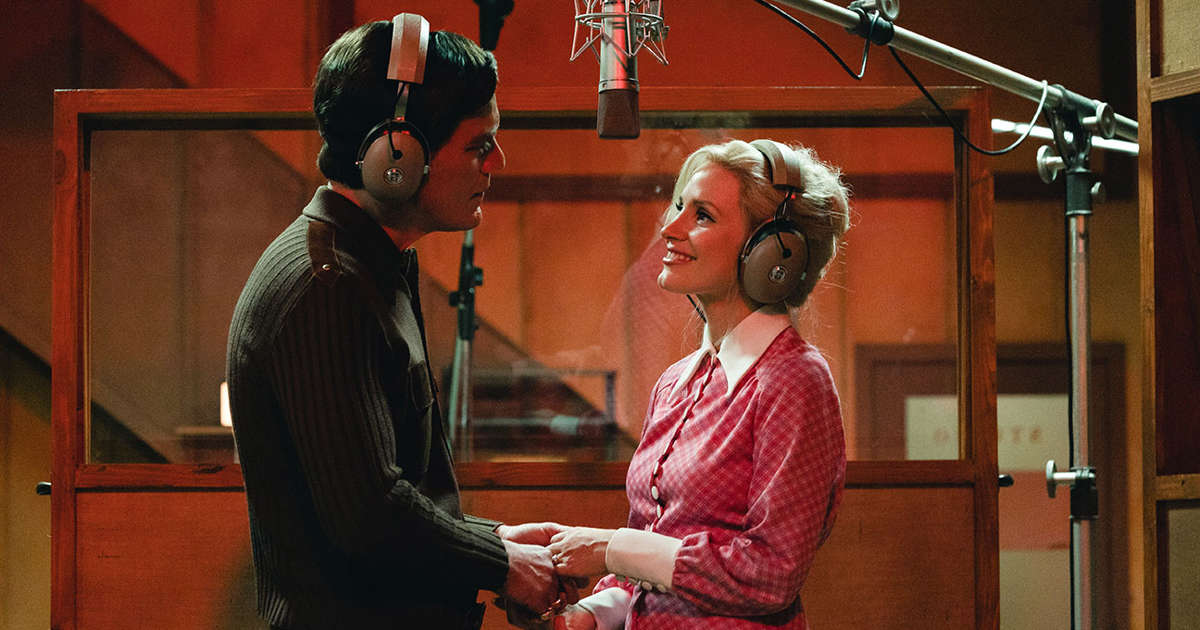
© Paramount
Watching a newly-in-love George Jones (Michael Shannon) and Tammy Wynette (Jessica Chastain) perform together at a bar, country music producer Billy Sherrill (David Wilson Barnes) takes in the crowd’s rapturous reaction.
“Look at how they look at them,” he remarks to songwriter George “Rich” Richey (Steve Zahn) beside him. “George and Tammy are every man who ever loved a woman, and every woman who ever loved a man.” Rich suggests it’s “just poetry,” but Billy sees something else. “Not poetry. Commerce,” he says, adding only after a pause: “And poetry too, I suppose.”
More from The Hollywood Reporter
It’s true the two are inextricably linked in Showtime’s George & Tammy, which charts a relationship in which the tumultuous romance fed the chart-topping music, and vice versa. But it’s the first part of Billy’s statement that truly gets to the heart of the series. This is, above all, a love story, almost as gripping and plaintive as the tunes that skyrocketed the pair into lasting fame.
Created by Abe Sylvia (who wrote last year’s Oscar-winning Chastain vehicle, The Eyes of Tammy Faye) and directed by John Hillcoat (Triple 9), the miniseries does not aim to reinvent the artist-biopic wheel. Its structure is a fairly straightforward chronicle of the pair’s journey — from their first meeting in the late ’60s through their rocky marriage in the ’70s and all the way into their final collaborations in the ’90s. (“Why should we let divorce ruin a perfectly good partnership?” Tammy asks wryly.)
Nor does it completely manage to sidestep the clichés of a music-biz drama, like iffy wigs and hit songs deployed as overly literal descriptors of events we’re already watching unfold. Its very premise can’t help but invoke the likes of Walk the Line or A Star Is Born, particularly in a first episode that introduces Tammy as a rising star on the Nashville scene, and George as a slightly faded one suffering an alcoholic addiction so severe that his bandmate (Walton Goggins) is forced to duct-tape his knees in order to keep him upright enough to perform.
But perhaps because it’s based on a memoir written by someone so entangled in both their lives — their only biological daughter, Georgette Jones — the series’ perspective remains unusually up close and personal, focused above all else on the relationship itself as experienced by the two people inside it. To tell that story, George & Tammy gives itself the luxury of time. Although the series is a fast-paced one, in that it covers roughly a quarter of a century over six hourlong episodes, it takes great care not to rush the moments that make up those decades. It leaves room for uncertain silences, for meaningful glances, for playful moments with the kids or arguments rehashed again and again over time.
Most of all, it lingers on the way Tammy and George simply look each other, and Chastain and Shannon speak volumes through the way their eyes light up or darken or soften around one another. That both turn in exceptional performances should come as little surprise (even if their impressive singing voices do). But in scenes together, the intensity of their chemistry seems to show each of them in a whole new light.
From that firsthand angle, labels and stereotypes that might apply from afar tend to melt away. Tammy isn’t merely some meek little lady standing by a man who did her wrong, but an ambitious talent whose love outweighs her reservations until it doesn’t. George is a terror when drunk, and George & Tammy‘s harrowing depictions of his violent rampages make no excuses for his behavior. But he’s also more than the sum of his worst habits, and the series takes pains to show the gentleness and humor that were also integral to his personality. You can judge their choices — and the series is well aware of how destructive and tragic many of them will turn out to be — but you’ll understand, at the very least, how they got there.
The tradeoff to such intimacy is a sense of scope. The pair’s ballooning successes can be gleaned from snippets of dialogue about charts and records, or from shots of glamorous venues and roaring crowds. Tammy and George’s places in country music history or culture more generally are hinted at here and there, by questions posed by a fan about Tammy’s anti-feminist messaging or one directed to George by a radio host about his opinions on modern country music. But the series does not dwell on such issues long enough to make any particular statement about what George and Tammy’s lives and careers might represent to those outside themselves. For that matter, it does not even dig very deeply into their relationships with those in their inner circle, like their next spouses or their children.
Yet this narrowness reads, in a certain light, less as a limitation than as a show of empathy. Throughout George & Tammy, George expresses ambivalence about the divide between “George Jones,” the charismatic star beloved by millions, and “Glenn,” the troubled human man he actually understands himself to be. That this series exists at all testifies to the enduring appeal of the former: Plain old Glenns don’t get glossy Hollywood projects about their lives, and this one’s A-list cast, sensitive direction and inescapably catchy soundtrack are bound to reinforce or introduce the legend of George Jones and Tammy Wynette to a fresh audience of TV viewers. In the end, however, it’s the latter that proves the key. George & Tammy succeeds where so many other biopics fail: by bringing its subjects to life not as legends — but simply as a man and a woman, profoundly and imperfectly in love.
Best of The Hollywood Reporter
For more stories like this, follow us on MSN by clicking the button at the top of this page.
Click here to read the full article.